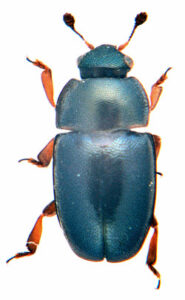This article was written by Dwiti Mistry, Canola & Dry Bean Research Assistant
The major canola insect Brassicogethes viridescens, or the pollen beetle, is of growing concern in Canada as it has the potential to significantly impact yield from canola crops. The pollen beetle is a known canola pest in Europe and has also been an established pest in the provinces of Nova Scotia, Prince Edward Island and Quebec. Canola growers and researchers in Canada anticipate the westward expansion of the pollen beetle across the country and thus research on the insect’s location and impact on yield is currently underway to monitor the progression of the pest. The pollen beetle is a shiny bronze-green beetle with a 2-2.9 mm long convex shape and has yellow-orange legs and mouth.
Figure 1. Brassicogethes viridescens, the pollen beetle. Reference: UK Beetles
The pollen beetle life cycle involves overwintering along the borders of canola and other Brassiceae fields during the colder months and emergence in the spring season when temperatures are consistently above 12-15 C. The adult pollen beetles will fly to various flowering crops to feed on the pollen and flowers before looking for Brassicaceae family crops to lay their eggs in. A specific interaction must occur between the Brassicaceae plants and the pollen beetle which involves chemical cues from the buds of the plants that the pollen beetles will use to determine the quality of the oviposition site before laying eggs. The pollen beetles will lay eggs inside closed buds and upon hatching, the larvae will feed on the pollen inside the bud before moving out of the bud to feed on the pollen of the flowers. The larvae then drop to the soil, pupate, and new adults will emerge in time to move for overwintering.
Damage to Brassiceae crops and specifically canola crops will occur when the larvae feed inside the bud at the early bud stage leading to bud abortion and subsequent yield loss. Adults may feed on buds but primarily feed on pollen and opened flowers which avoids significant damage and bud abortion. Pollen beetles are most likely to affect spring canola because winter canola typically flowers well before the pollen beetle emerge from overwintering. This timeline prevents the beetles from laying eggs at the early bud stage of the crop to avoid significant bud abortion and yield loss. Therefore, pollen beetles are a greater threat to spring canola crops.
Canola plants are robust in that they can compensate for aborted buds by producing new buds to offset low levels of pollen beetle larvae feeding. At high infestation rates, pollen beetle feeding can cause yield loss. Action thresholds for controlling the pest are currently being researched. Further research into this pest, threshold and its movement across the country is anticipated to help canola growers manage pollen beetle before economic yield threshold is significantly impacted. Surveys for pollen beetle are being conducted in canola fields across Canada. To date, pollen beetle has not been confirmed in Ontario.
Sources:
UK Beetles – Brassicogethes viridescens
Integrated Management of Insect Pests on Canola and Other Brassica Oilseed Crops

